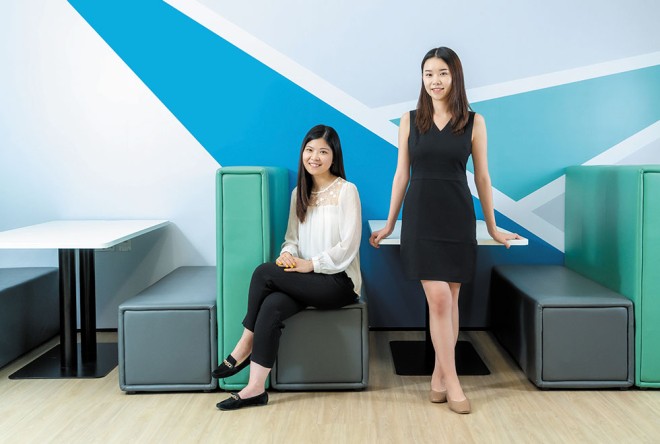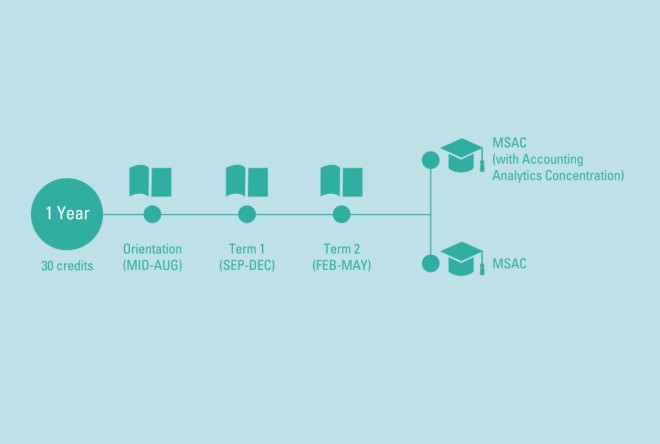Learning to Collaborate and Communicate
Internships at KPMG allow HKUST students to experience working life at one of the ‘Big Four’

[Sponsored Article]
KPMG’s 10-week paid internship program allows HKUST Master of Science in Accounting (MSAC) students in the accounting analytics concentration to experience working life at this professional services firm. Offered through KPMG’s University Collaboration program, participants also learn about the industries and clients that KPMG services, and begin to develop a network of professional relationships. Five MSAC students joined the first internship program, and the number is expected to increase as the program evolves. KPMG is one of the “Big Four” professional services firms.
MSAC student Suri GUO has an academic background in accounting and auditing. Her internship with KPMG’s IT Advisory (ITA) practice allowed Suri to discover the growing importance that high-level professional advisory services play in helping clients meet their IT objectives. “I have always been interested in advisory work, and my internship allowed me to really explore my interests,” says Suri. For example, she was able to learn the importance of combining data analytics and IT solutions with professional insights to support a client’s decision-making process. “ITA work is not about coding. It requires knowledge of the latest IT trends, and the use of analytical data to develop a clear IT strategy that supports the client’s business objectives,” says Suri.
A drive to nurture accounting and business analytics talent
The collaborative arrangement between KPMG and the HKUST Business School includes courses, seminars, workshops, mentorships, and internships. These allow MSAC students to gain practical and academic knowledge from experienced industry practitioners. The internship program is part of a drive to nurture new accounting and business analytics talent.
Suri spent most of her 10-week internship working with KPMG advisory experts. She was part of a team which helped an international bank form a strategy for implementing an organization-wide digital transformation program. Suri’s responsibilities included helping to consolidate and participating in fine-tuning of proposals, and this exposed her to the issues, processes and challenges that IT advisory work involves.
“Our classroom data and software studies helped me to prepare for the experience,” explains Suri, who has been offered a full-time position with KPMG (Audit Team). Before enrolling in the HKUST MSAC program, Suri spent over four years working in KPMG’s auditing practice in Shenzhen. Around 80 HKUST interns and graduates join KPMG each year, and this represents about 20 per cent of KPMG hires from local universities over the last three years.
Fellow MSAC student, and KPMG intern, Stephanie CHEN says the 10 weeks she spent with KPMG’s ITA Advisory practice also steered her towards a career in advisory work. “I had always thought I would work in auditing,” says Stephanie, whose academic background is in accounting and auditing. “But after studying big data and data analytics in the classroom, I realized they can be combined with traditional accounting skills,” she adds. The skills she learnt in the classroom as part of the MSAC program taught her how to apply her knowledge to real life situations faced by professional advisers or consultants, she adds. Stephanie and Suri both say that Professor Tony SHIEH, Academic Director of the HKUST MSAC, helped them gain the maximum benefit from their internship experiences.
A rewarding experience
Stephanie spent her 10 weeks on-site with a KPMG multi-disciplinary project team which provided advisory services to a major logistics organization. “I was involved all the way from the kick-off meeting and the interviews with key client personnel, to the production of the final report at the end,” she explains. Her colleagues were extremely supportive and went out of their way to make sure she felt she was a key member of the team, she adds.
Stephanie says she enjoyed the chance to expand her capabilities, and she learned the value of communicating clearly with her colleagues and the client. “I realized the importance of preparing answers in advance, in case you get asked tricky questions,” she notes. “Being proactive is a good way of demonstrating commitment,” she adds.
Along with providing an opportunity to apply the knowledge and skills learnt in the classroom to the workplace, the KPMG internship program provides a structure for developing soft skills. There are opportunities to build a rapport with colleagues, engage in teamwork, and to learn how to collaborate and communicate clearly and professionally.
Suri and Stephanie were also introduced to KPMG’s corporate social responsibility (CSR) activities and its Digital Ignition (KDi) initiative, which are designed to help drive innovation and digital transformation for the firm and its clients. They were also invited to take part in social activities.
To help students to make the transition from the classroom to the workplace, each intern is assigned a mentor, a senior KPMG staff member, and a “buddy” — a professional who is in the early stages of his or her career. Interns are invited to discuss their career goals and set expectations for the outcome of their internship experience. They are also encouraged to stay in contact with fellow interns after the program has ended.
“Mentors and buddies help you to get the most out of your internship,” says Suri. Interns should not to be afraid to ask questions, should seek advice when they need it, and should research topics ahead of time, so that they are prepared to contribute to projects and work as an effective part the team, Suri says.
Christian LEUNG, Associate Director, KPMG China, was impressed by the level of maturity, professionalism and wide-ranging practical skills the HKUST cohort of MSAC students demonstrated. Echoing similar sentiments, Garmen CHEN, senior consultant, KPMG China, says that students demonstrated solid skills and a positive attitude. “HKUST students bring additional passion, energy and support to our complex work," notes Chen.
Concentration in Accounting Analytics
A new Accounting Analytics concentration has been added to the MSAC Program starting from the academic year 2019-20. Students who opt for the Accounting Analytics concentration are required to take four electives in Accounting Analytics as part of the program requirements.

